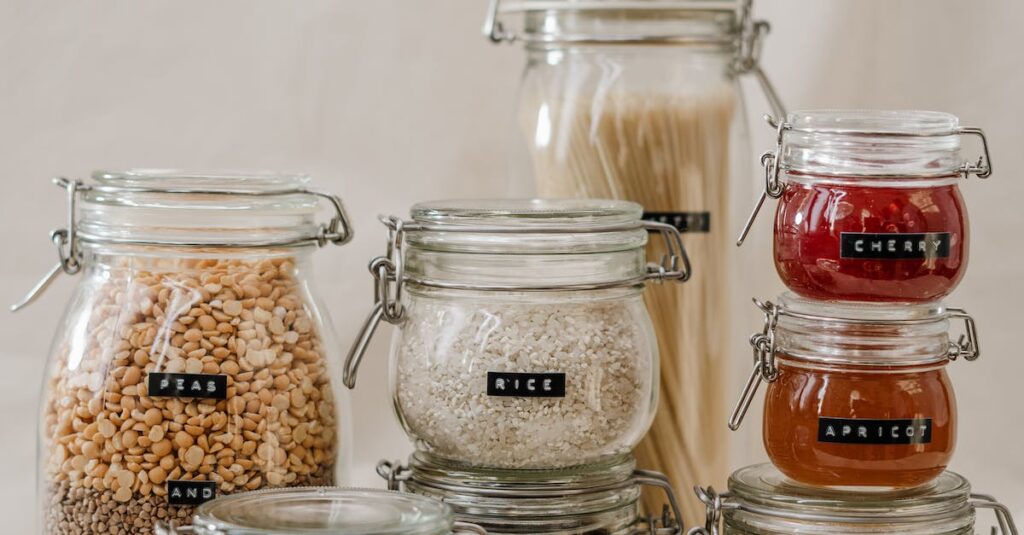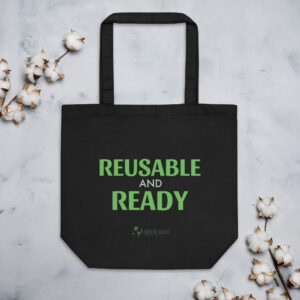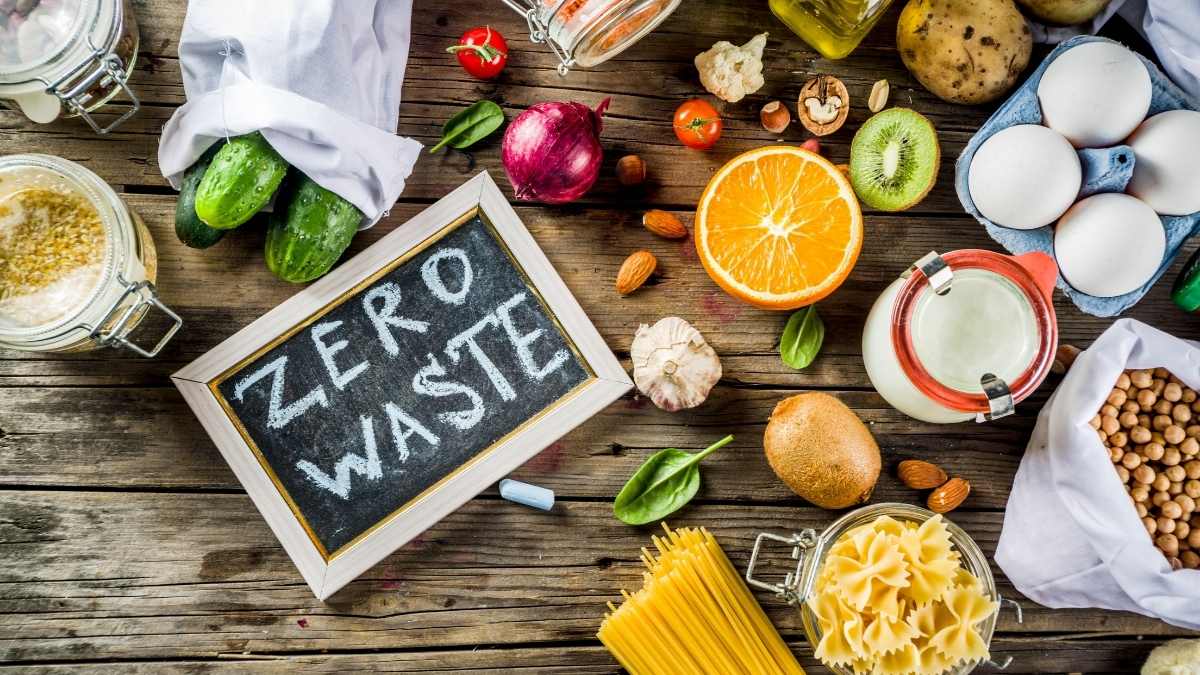Tackling food waste might seem daunting, but with savvy meal prep strategies, you can easily transform your kitchen routines to be efficient and eco-conscious.
Zero waste tips not only help in reducing your environmental footprint, but they also streamline your cooking process and save you time and money. The key is to prep your meals in a way that limits waste to the bare minimum.

By adopting a zero waste meal prep routine, you’re committing to smarter food usage—maximizing the potential of every ingredient you buy. This involves getting creative with leftovers, storing food properly to extend its freshness, and making stock from scraps. Embracing these habitual changes means you’ll be throwing less in the trash and spending less time pondering what to cook next.
Remember, incorporating food waste reduction into your meal prep doesn’t have to be an all-or-nothing approach. Even small, mindful adjustments in how you shop, prepare, and store your food can amount to significant changes for both the planet and your wellbeing. So, sharpen your knives and ready your containers; it’s time to meal prep like a pro, the zero waste way.
The Basics of Meal Prep
Embarking on your meal prep journey allows you to save time, streamline your cooking process, and ensure you’re eating nutritious meals consistently. Remember, effective meal prepping is rooted in solid planning and organization.
Understanding Meal Prep
Meal prepping is the practice of preparing whole meals or dishes ahead of schedule. It’s particularly popular among busy people because it can help save time and reduce food waste. By planning your meals, you can cook in batches and have your meals ready for the week. This not only ensures that you eat nutritious meals, but also helps you stick to your dietary goals.
Essentials for Getting Started
To get started with meal prepping, you’ll need some basic supplies:
-

Fashionably Green and On-The-Go
£16.50 Select options This product has multiple variants. The options may be chosen on the product page -

Reusable and Ready Eco-Friendly Tote Bag
£16.50 Add to cart
- Containers: Invest in quality, microwave-safe containers that stack well in your fridge.
- Basic Cooking Tools: A good set of knives, pots, pans, and baking dishes will make meal prepping easier.
- Basic Ingredients: Keep your pantry stocked with essentials you frequently use in recipes, like spices, oils, and grains.
With these items on hand, you’re well-equipped to tackle meal prepping.
Planning Your Meal Prep Strategy
Planning is key to successful meal prepping. Follow these steps to create your meal prep strategy:
- Choose Your Recipes: Pick several recipes that you like and that use similar ingredients to maximize efficiency.
- Create a Shopping List: This helps prevent impulse buys and ensures you have exactly what you need.
- Schedule Prep Time: Decide on a day to do your cooking, and block out sufficient time to prepare your meals.
Remember to plan ahead not just for dinners, but for all your meals—including snacks—to get the most out of your meal prep efforts.
Zero Waste Tips for the Kitchen
Making your kitchen zero waste-friendly is a journey of mindful shopping and sustainable practices. Your choices from ingredients to storage can significantly cut down on food waste and plastic usage.
Choosing Sustainable Ingredients
When meal prepping, selecting ingredients that support a zero waste lifestyle is crucial. Head to your local farmers market for fresh produce without the plastic packaging. Not only do you support local agriculture, but you also reduce the transportation emissions associated with long-distance food shipping. Additionally, buying in bulk can minimize packaging waste—think large bags of rice or beans, which also tend to be more cost-effective.
Bulk buying tips:
- Bring reusable bags and containers for your produce and dry goods.
- Look for items with minimal to no packaging, or packaging that’s easily recyclable or compostable.
- Plan ahead to ensure you only buy what you need, which helps avoid food spoilage.
Eco-Friendly Food Storage Solutions
After choosing your ingredients, storing them correctly ensures they last longer and reduces waste. Opt for glass containers or mason jars, which are not only reusable but also free from chemicals found in plastic containers. These can be used for both dry goods and leftovers. Silicone bags offer a durable and sealable option as well, perfect for fridge or freezer storage.
Storage solutions:
- Glass containers: Ideal for leftovers, meal-prepped dishes, or bulk ingredients.
- Mason jars: Perfect for salads, smoothie ingredients, or dry pantry staples.
- Silicone bags: Versatile for all types of food, including marinating meats or freezing fruits and vegetables.
Invest in a set of good-quality food storage containers that last for years, aiding your zero waste journey and keeping your food fresher, longer.
Smart Grocery Shopping Strategies
Effective meal prep starts with smart grocery shopping. By focusing on bulk bins and the right staples, you can save money and dramatically reduce food waste.
When you’re at the store, head straight for the bulk bins. Buying items like beans and rice from these bins can help you purchase the exact amounts you need, which means no excess food to potentially waste. Take note of the different varieties to add versatility to your meals, such as black beans for a Mexican-inspired dish, or lentils for hearty stews.
For fresh produce, choose seasonal items; they’re often more affordable and fresher since they haven’t travelled as far. Planning meals around seasonal produce also adds natural variety to your diet throughout the year.
Buying and Storing Pantry Staples
Your pantry is your arsenal for meal prep success. Stock up on pantry staples such as dried herbs, spices, and whole grains. Store them in airtight containers to maintain freshness longer. For dry goods like flour or sugar, consider purchasing from bulk bins using reusable bags to reduce packaging waste. These staples can form the foundation of countless meals, supporting both your budget and zero waste goals.
Advanced Meal Prep Techniques
Elevate your meal prep game with advanced strategies that not only craft healthy meals but also emphasize a zero-waste approach. Master batch cooking and utilize kitchen tools to maximize efficiency and minimize waste.
Batch Cooking and Effective Use of Tools
Through batch cooking, you can prepare large quantities of food at once, saving time and ensuring you have healthy meals available throughout the week. Use your Instant Pot and crockpot to make big batches of grains, beans, or soups that can easily be portioned for future meals.
- Grains: Cook quinoa, rice, or oats in your Instant Pot.
- Beans: Use your crockpot for legumes like chickpeas or black beans.
- Soups: Combine vegetables and broth in an Instant Pot for quick, hearty soups.
Incorporating tools like a food processor can speed up your prep. It’s excellent for quickly creating salsas, shredding vegetables, or making dough. When storing your meals, lunch boxes with compartments are invaluable, helping you separate portions and keep ingredients fresh.
Creating Zero-Waste Meal Prep Plans
Zero-waste meal prep involves mindful planning and smart use of ingredients to avoid food waste. Start with a zero waste meal plan that incorporates the entirety of your groceries—think carrot tops into pesto or vegetable scraps for homemade broth.
- Assess your pantry to reduce buying duplicate items.
- Plan your meals around overlapping ingredients.
- Shop with reusable containers to reduce packaging waste.
Remember, every part of your produce can be used. The skin of cucumbers or potatoes, often discarded, is rich in nutrients and perfectly edible. Simple changes, like batch cooking in a mindful way, can significantly reduce your kitchen waste.
Managing Leftovers and Food Waste
Effective management of leftovers and food waste is crucial for both the environment and your wallet. With the right strategies, you can transform what might be thrown away into nutritious meals and meaningful contributions to sustainability.
Transforming Leftovers Into New Meals
You can breathe new life into your leftovers by getting creative in the kitchen. For example, your dinner’s roasted vegetables can be the next day’s vibrant addition to a hearty frittata or turn yesterday’s chicken into a savory broth for a comforting soup. Starting with a theme for the week can streamline your efforts in reducing food waste.
- Last Night’s Grains: Make a stir-fry incorporating leftover rice or quinoa.
- Veggie Scraps: Save them in the freezer until you have enough for a homemade veggie broth.
Composting and Reducing Kitchen Waste
Reducing kitchen waste isn’t just about cleverly using leftovers; composting plays an integral role. When you compost food scraps, you help decrease greenhouse gas emissions and contribute to replenishing soil health, positively impacting climate change.
- Start Small: A countertop bin can be your introduction to composting.
- Recycling: Know what can be recycled locally to prevent recyclables from contributing to food waste.
By incorporating these measures into your meal prep routines, you are taking significant steps in food waste reduction, thereby lessening your environmental impact.

